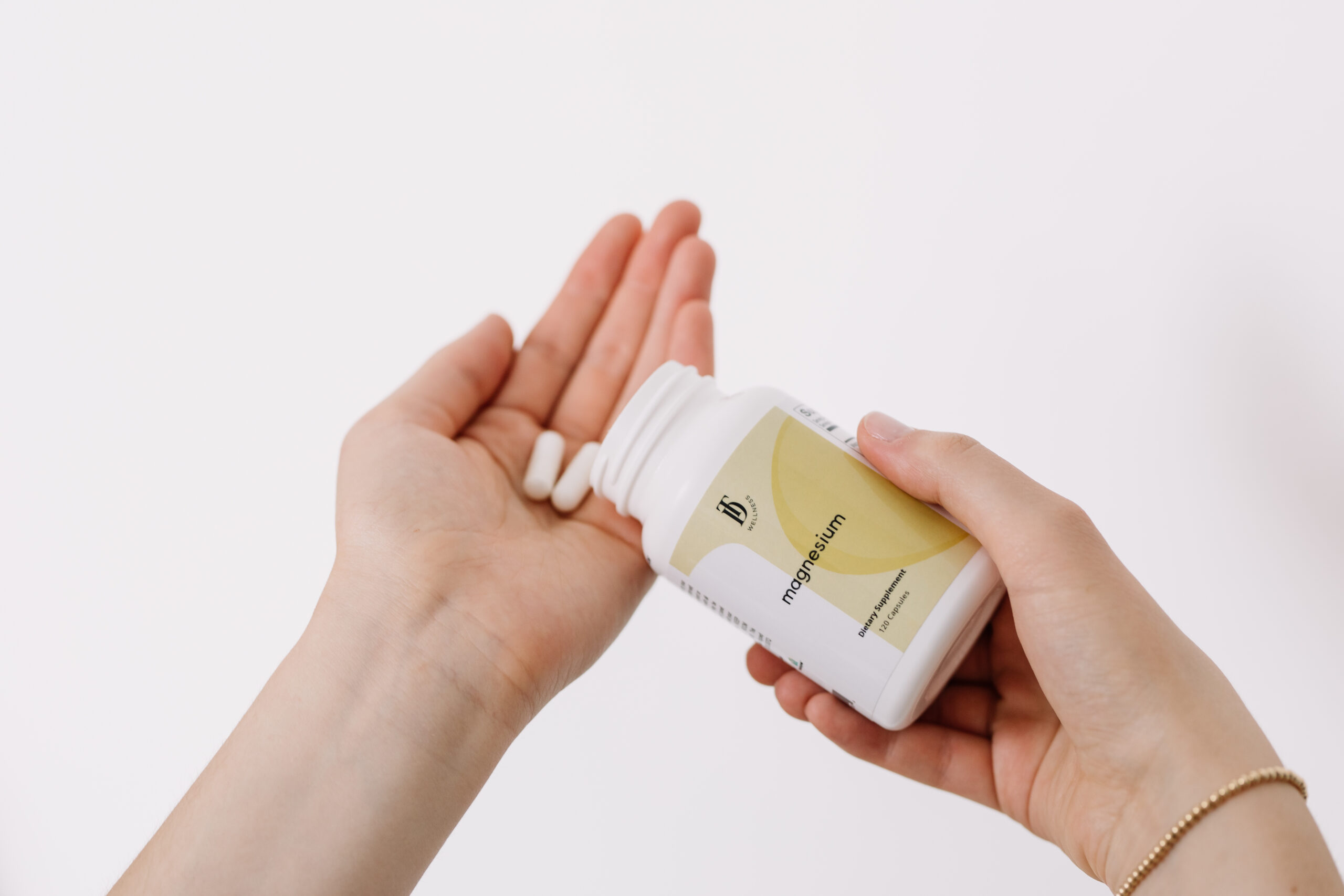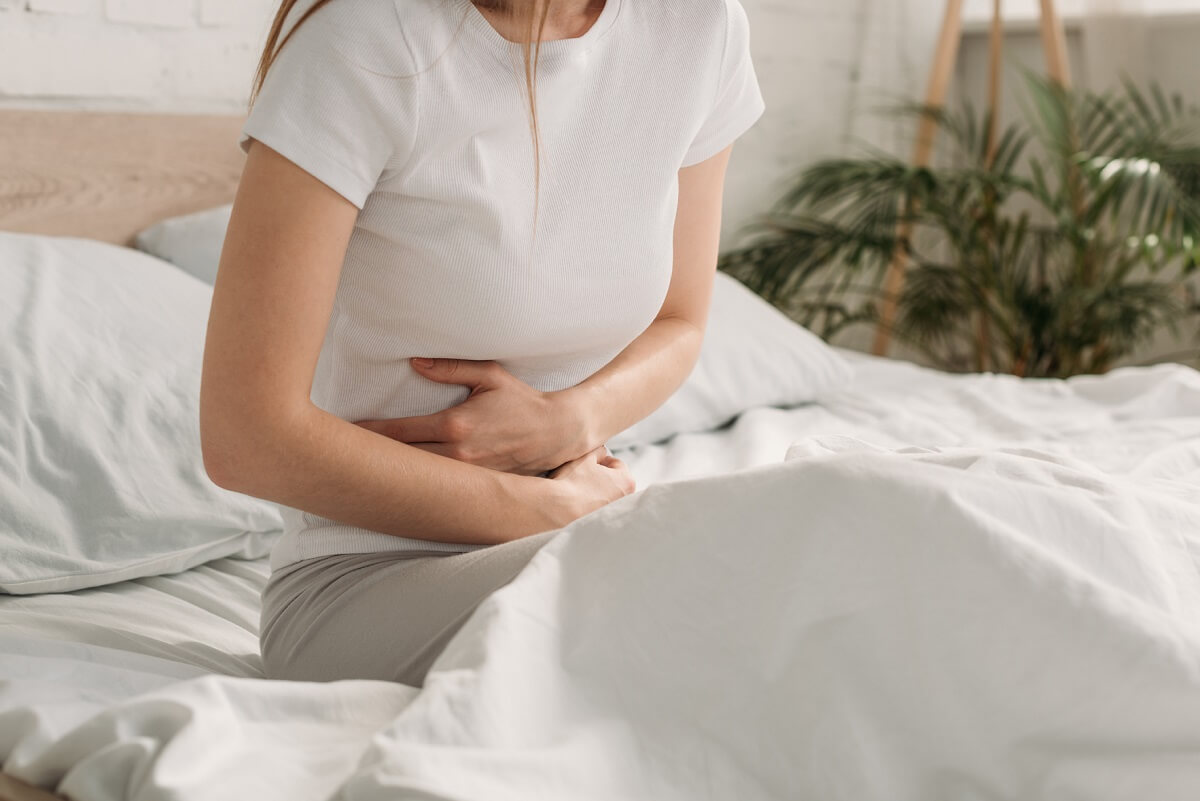How to Naturally Navigate Perimenopause and Menopause

Because they are rarely talked about before they arrive, many women don’t have much of a knowledge base about what happens and what to expect during perimenopause and menopause. If you want to naturally navigate these seasons in life, I want to support you! There is no need to fear or dread the transition because there are so many things you can do to improve symptoms, retain balance, and look and feel well.
What are perimenopause and menopause?
Menopause is a point in time 12 months after a woman’s last period. The years leading up to that point are called the menopausal transition, or perimenopause. This is when women may have changes in their monthly cycles and experience the symptoms commonly associated with this phase in life.
Perimenopause begins in the mid 30s to late 40s. It usually lasts around seven years but can last over a decade for some. The duration can depend on lifestyle factors including smoking, stress, age, race and ethnicity. Menopause is when you’ve gone 12 months without a menstrual period, and that typically happens in the 40s or 50s. The average age is 51-52 years old in the United States.
During perimenopause, the predictable pattern of sex hormones experienced in the teens, 20s and 30s begins to change. Perimenopause is characterized by uneven swings in estrogen, progesterone and androgens. These hormones behave more unpredictably in the late 30s and 40s as menopause approaches. The closer you get to menopause, the more the production of these hormones decreases altogether.
Every woman experiences perimenopause and menopause uniquely. Some have very few symptoms while others experience strong, varied and challenging mental, physical and/or psychological symptoms.
What are common symptoms experienced during perimenopause?
During the perimenopause years as hormone function changes in dramatic ways, so do other aspects of health. The body metabolizes energy and hormones differently. Weight gain happens more easily. Bone density may decrease. Heart health can change. And body composition can experience large shifts.
Some of the more commonly noted symptoms of perimenopause include:
- Irregular menstrual cycle
- Hot flashes
- Difficulty sleeping
- Low libido
- Brain fog
- Vaginal dryness
- Chills
- Changes in mood
- Weight gain
- Night sweats
- Hair thinning
- Dry and brittle skin
- Loss of fullness in the breasts
Low Progesterone and/or Estrogen Dominance
While estrogen decreases drastically during menopause, it’s important to note that estrogen levels do not drastically decline until after a woman’s last period. During the first years of perimenopause while a woman is still cycling, even if irregularly, progesterone declines first while estrogen levels stay the same or even increase. This uneven ratio of progesterone to estrogen can lead to estrogen dominance. Many women can suffer from the effects of estrogen dominance during perimenopause for up to ten years, beginning as early as age 35.
Symptoms of estrogen dominance and/or low progesterone include:
- Irregular periods
- Infertility
- Bloating
- Breast swelling and tenderness
- Fibrocystic breasts
- Mood changes, including anxiety and depression
- Weight gain, especially in the midsection
- Decreased libido
- Increased PMS symptoms
- Brain fog
- Hair loss
- Thyroid dysfunction
- Fatigue
- Difficulty sleeping
Low Testosterone
Testosterone levels may decline long before the last menstrual cycle. Depending on the woman, some experience little to no symptoms around low testosterone levels and others experience significant symptoms. Symptoms of low testosterone include:
- Low libido
- Vaginal dryness
- Dry, brittle skin
- Decreased sexual response
- Mood changes, including depression
- Thinning hair
- Muscle weakness and muscle mass loss
Low Estrogen
Estrogen is often the last hormone to decline during the transition to menopause. But low estrogen is also the culprit behind many of the traditional menopause symptoms as we know it.
As menopause approaches, the ovaries slow their production of estrogen and the adrenal glands are responsible for taking over as the body’s main producer of sex hormones. In fact, the amount of circulating estrogen in the body decreases about 30-60% for most women in menopause. The ovaries continue to produce a very small amount of estrogen for the rest of your life, but this dramatic drop in estrogen production can lead to many symptoms:
- Hot flashes
- Night sweats
- Mood swings
- Vaginal dryness
- Vaginal atrophy
- Dizziness
- Loss of bone density
- Headaches
- Brain fog
- Fatigue
- Urinary incontinence
- Increased susceptibility to vaginal infections and UTIs
Importance of Overall Hormone Balance (at any and every age!).
While many focus on sex hormone imbalance and decline during the transition to menopause, I cannot understate the importance of overall hormone health and balance during the years leading up to menopause as well as during the time of menopause itself.
Just like you cannot completely separate one part of the body from another when trying to get healthy, you cannot separate sex hormones from other hormones when seeking balance. Hormones can be likened to dominoes – they all affect each other! So when stress hormones such as cortisol are elevated, it can lead to downstream effects in throwing off sex hormones. Same with those that manage metabolic activity and blood sugar balance like insulin.
For this reason, I’m a huge believer in taking a whole-person approach to perimenopause and menopause symptom reduction. Rather than band aid prescriptions, working to balance hormones – all hormones! – is the most profound approach.
Overall hormone health and balance is what will ultimately reduce menopausal symptoms and create a smoother and more graceful transition. And the good news? There are so many ways to support hormonal health!
What are lifestyle factors that can improve the transition to menopause and remediate symptoms?
While I absolutely feel that working to balance all hormones and improve overall well-being is what will lead to a smoother transition to menopause, there are still plenty of things you can do to reduce symptoms you might be experiencing right now! I want to equip you with ways to both reduce symptoms from an immediate as well as a root cause standpoint.
Here are some of the lifestyle factors you can modify in order to improve the symptoms outlined above. And bonus, these changes will actually improve your hormonal health, too:
Balance your blood sugar.
Balancing blood sugar keeps the body from swinging between high blood sugar and low blood sugar, which may trigger hot flashes.
A balanced breakfast including a clean protein and healthy fat is essential to balancing blood sugar for the remainder of the day. Other ways to balance blood sugar include: Eat on a regular schedule; always have a protein and/or fat with your carbs; eat a no/low sugar or processed food diet.
I want to point out that it’s important to include some healthy, complex carbs at your meals, as eating a very low carb diet can increase cortisol levels, which can throw off hormones and cause symptoms such as hot flashes. Proper blood sugar balance can lower adrenaline and cortisol levels, which will ultimately help regulate sleep, body temperature, cravings, weight and mood.
Get rid of endocrine disruptors in your environment.
Endocrine disruptors disrupt hormone function and overwhelm the body’s detox system. This is double trouble because hormone disruption of any kind can exacerbate menopause symptoms. Additionally, when the body’s detox systems are backed up, you’re unable to metabolize and dispose of old hormones. Your level of exposure to endocrine disrupting toxins makes a big difference in your ability to smoothly navigate perimenopause.
Rid your home of as many plastics as possible, especially in the kitchen. Switch to glass, stainless steel or cast iron food storage, tableware and cookware. Switch out conventional personal care products for non-toxic products. You can find a master list of everything I love that is non-toxic HERE.
Engage in positive stress management and slowing down.
Life during perimenopause poses unique stressors: raising kids, working long hours, financial stressors, busy schedules, aging parents and the normal ins and outs of daily life. High stress, when not dealt with properly, can lead to chronically high levels of the stress hormone cortisol. As we learned earlier, stress hormone imbalance can further disrupt sex hormone balance.
I truly cannot overstate the importance of managing stress in a healthy way for a smooth perimenopause and menopause (as well as for wellbeing in general!).
Getting outdoors has been shown to predictably reduce cortisol levels. I also suggest prayer, light exercise, journaling, reading the Bible, meditation, conversing with a loved one, disconnecting from technology, or whatever else you do that puts you more at ease.
Cut the foods and drinks that can increase hot flashes, insomnia and hormonal imbalance.
Caffeine, alcohol and spicy foods can all trigger hot flashes, insomnia, and hormonal fluctuations. I don’t mean to be the bearer of bad news, but if you’re struggling with any of the above, I’d cut these foods/beverages.
Nourish the adrenal glands.
The adrenal glands take over for the ovaries in making the majority of all sex hormones after menopause. If chronic stress is present and the adrenal glands are required to produce large amounts of cortisol and adrenaline, they may not be able to keep up with the demand for sex hormone precursors. Additionally, high cortisol production has been linked to bone loss. And increased cortisol can be behind worsening hot flashes, as hot flashes and night sweats are actually caused by an adrenaline surge.
It’s a must to focus on adrenal health as a foundation to any perimenopause plan. Lower adrenal activity through avoidance of blood sugar swings, treatment of insomnia, stress reduction and modifying exercise.
Increase fiber intake in order to excrete old hormones.
Excess estrogen and “used” hormones are processed through the liver and ultimately detoxed out of the body through the stool. If you’re struggling with constipation, old hormones may be continually recycled instead of excreted out of the body. Increasing fiber intake is incredibly important for regularity and proper detox.
Eat to optimize micronutrient intake and avoid excess hormones.
Micronutrients including vitamins, minerals and antioxidants are important to stave off inflammation as well as provide the body with the “building blocks” necessary to create hormones and maintain hormonal balance. At the same time, it’s important to avoid food, such as conventional dairy, which may have been injected with hormones and antibiotics.
My solution? Eat organic when possible. Eat a whole food, nutrient dense diet including plenty of clean protein, healthy fats and some complex carbohydrates. Avoid sugars and processed foods when possible.
Exercise in a way that promotes healthy endorphin release.
Exercise is important to prevent bone loss, protect cardiovascular health, prevent depression, improve sex drive, decrease chances for weight gain and reduce hot flashes. However, exercise that’s too intense can actually trigger excessive cortisol and adrenaline, increasing the likelihood of hot flashes.
Aim to exercise 3-5 times per week with a mix of activities. Find something you enjoy! Try to incorporate both cardiovascular and weight bearing activities.
Improve your sleep hygiene to improve hormone balance and symptom reduction.
Sleep is healing. It’s healing for your whole body, but especially for hormonal balance. Aim for a minimum of 7 hours of sleep per night, uninterrupted if possible. Limit temperature fluctuations by keeping your room around 67F and dressing in light cotton.
Topical Vitamin E to relieve temporary vaginal dryness.
Use topical vitamin E for temporary relief from vaginal dryness. You can either pierce a capsule and insert it into your vagina (using a clean needle to pierce) or you can apply a vitamin E oil with your fingers.
Improve gut health and liver health for their cascade of benefits.
Gut health affects everything. Fostering a strong microbiome will decrease inflammation and relieve constipation. It will improve nutrient uptake, hormone metabolism and even mood stability.
Taking care of your liver will reduce your total body burden. It will aid in detoxification, including that of hormones. Strengthening liver function and decreasing the workload on the liver by removing toxins from the diet and environment will ultimately help to balance hormones.
What are supplements that might improve perimenopause and menopause symptoms?
I will start out with the elephant in the room – hormone replacement therapy. In my opinion, there is a time and a place for hormone replacement therapy with bio identical hormones. But this is not a one size fits all matter. I like to first exhaust lifestyle and supplementation measures in order to balance hormones and remediate symptoms. Then, if bio identical hormone replacement therapy is determined to be necessary or beneficial, I do a whole host of testing to make sure my client is a good candidate. This includes testing on family history, genes, how the client metabolizes and breaks down hormones (tested via DUTCH test) and more. This is specific and specialized, and it should be done while working closely with a provider. You can get access to the DUTCH test at a special price through my TDW Community.
Below, you’ll find supplements that are beneficial on a more broad and universal level. As a healthcare professional, I reach for these first before hormones or pharmaceuticals.
TDW Transition
I wanted to create a single product that could offer multiple-faceted benefits to combat the common complaints associated with the transition to menopause including vaginal dryness, hot flashes, night sweats and nighttime awakenings. And this is it! This powerful but gentle blend of botanicals is my foundational supplement of choice in supporting clients during perimenopause and menopause.
With a suggested usage of two pills per day, many of my clients have found this supplement alone has made a huge difference in their journey to finding symptom relief.
Melatonin
Studies have shown that melatonin supplementation may postpone endocrine (aka hormonal) aging in women aged 40 to 60. It can improve sleep problems and other symptoms associated with the menopause transition, such as hot flashes and night sweats. Quicksilver Scientific Melatonin and Designs For Health Melatonin can be found on Taylor’s Fullscript.
TDW Stress Be Gone
Stress Be Gone helps regulate adrenal function. This ultimately improves stress resiliency, supports energy, and helps balance cortisol, or the “stress hormone.” As discussed above, balancing cortisol is incredibly important for a smoother transition into menopause.
TDW Magnesium
My favorite supplement! Magnesium helps with all sorts of enzymatic processes in the body including those that help decrease stress, reduce anxiety, relieve muscle tension, and improve sleep.
TDW Vitamin D3/K2
Vitamin D3/K2 helps prevent bone loss associated with perimenopause. Supplementing with Vitamin D3/K2 can also help maintain healthy cardiometabolic (heart, blood and blood vessels) function.
Raena for help in managing hormones.
If you are in need of hormonal support and want to work with a trusted healthcare professional, I’m a huge fan of Raena (use code TAYLORDUKES). Raena allows you to work individually with a provider who can order labs, analyze bloodwork and so much more. You can do this from the convenience of your home and if you are a good candidate for bio-identical hormone replacement therapy, then they compound the cleanest prescriptions and send them to you. This is an incredible resource for any woman who would like outstanding and thorough support during the perimenopause and menopause season of life.
Stay Updated on All Things Wellness
At Taylor Dukes Wellness, we are always working on new ways to serve you on your health journey. Be the first to learn about new healthy living resources, blog posts and TDW offerings, by getting on my insider list here.
Share This Post:
Your Wellness Deep Dive
- Be the first to learn about new healthy living resources, blog posts, and exclusive TDW offerings by getting on my insider list.
- Find healthy living products with ingredients you can trust – the same ones I personally use for myself and my family – in the TDW Shop. Check out our protein powders, electrolytes, supplements, and more!
- Get personalized support through the TDW Community. When you become a member, you get access to functional medicine expertise from me and my team, functional medicine lab testing and 1:1 consults, a digital library of exclusive wellness content, live monthly Q&As with me, and so much more!
YOU MAY ALSO LIKE:
Helping you get your gut right, improve energy, boost immunity, balance hormones, sleep better and look + feel your best
DISCLAIMER
PRIVACY POLICY
TERMS + CONDITIONS
ACCESSIBILITY
© 2025 Taylor Dukes Wellness
LEARN
SHOP
ABOUT
TDW Community
Free Guides
Blog
TDW Store
Fullscript
About Taylor
Press
Contact
COOKIE POLICY
SITE CREDIT
Trusted Products



